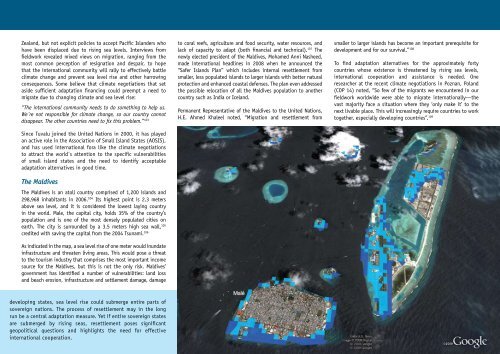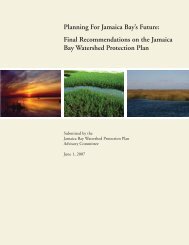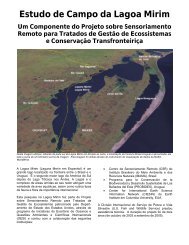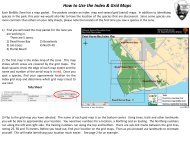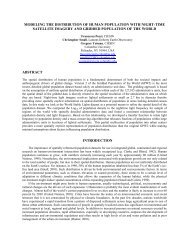In Search of Shelter - Center for International Earth Science ...
In Search of Shelter - Center for International Earth Science ...
In Search of Shelter - Center for International Earth Science ...
You also want an ePaper? Increase the reach of your titles
YUMPU automatically turns print PDFs into web optimized ePapers that Google loves.
Zealand, but not explicit policies to accept Pacific Islanders whohave been displaced due to rising sea levels. <strong>In</strong>terviews fromfieldwork revealed mixed views on migration, ranging from themost common perception <strong>of</strong> resignation and despair, to hopethat the international community will rally to effectively battleclimate change and prevent sea level rise and other harrowingconsequences. Some believe that climate negotiations that setaside sufficient adaptation financing could preempt a need tomigrate due to changing climate and sea level rise:“The international community needs to do something to help us.We´re not responsible <strong>for</strong> climate change, so our country cannotdisappear. The other countries need to fix this problem.” 103Since Tuvalu joined the United Nations in 2000, it has playedan active role in the Association <strong>of</strong> Small Island States (AOSIS),and has used international <strong>for</strong>a like the climate negotiationsto attract the world´s attention to the specific vulnerabilities<strong>of</strong> small island states and the need to identify acceptableadaptation alternatives in good time.The MaldivesThe Maldives is an atoll country comprised <strong>of</strong> 1,200 islands and298,968 inhabitants in 2006. 104 Its highest point is 2.3 metersabove sea level, and it is considered the lowest laying countryin the world. Male, the capital city, holds 35% <strong>of</strong> the country’spopulation and is one <strong>of</strong> the most densely populated cities onearth. The city is surrounded by a 3.5 meters high sea wall, 105credited with saving the capital from the 2004 Tsunami. 106As indicated in the map, a sea level rise <strong>of</strong> one meter would inundateinfrastructure and threaten living areas. This would pose a threatto the tourism industry that comprises the most important incomesource <strong>for</strong> the Maldives, but this is not the only risk. Maldives’government has identified a number <strong>of</strong> vulnerabilities: land lossand beach erosion, infrastructure and settlement damage, damagedeveloping states, sea level rise could submerge entire parts <strong>of</strong>sovereign nations. The process <strong>of</strong> resettlement may in the longrun be a central adaptation measure. Yet if entire sovereign statesare submerged by rising seas, resettlement poses significantgeopolitical questions and highlights the need <strong>for</strong> effectiveinternational cooperation.to coral reefs, agriculture and food security, water resources, andlack <strong>of</strong> capacity to adapt (both financial and technical). 107 Thenewly elected president <strong>of</strong> the Maldives, Mohamed Anni Nasheed,made international headlines in 2008 when he announced the“Safer Islands Plan” which includes internal resettlement fromsmaller, less populated islands to larger islands with better naturalprotection and enhanced coastal defenses. The plan even addressedthe possible relocation <strong>of</strong> all the Maldives population to anothercountry such as <strong>In</strong>dia or Iceland.Permanent Representative <strong>of</strong> the Maldives to the United Nations,H.E. Ahmed Khaleel noted, “Migration and resettlement fromMalésmaller to larger islands has become an important prerequisite <strong>for</strong>development and <strong>for</strong> our survival.” 108To find adaptation alternatives <strong>for</strong> the approximately <strong>for</strong>tycountries whose existence is threatened by rising sea levels,international cooperation and assistance is needed. Oneresearcher at the recent climate negotiations in Poznan, Poland(COP 14) noted, “So few <strong>of</strong> the migrants we encountered in ourfieldwork worldwide were able to migrate internationally—thevast majority face a situation where they ‘only make it’ to thenext livable place. This will increasingly require countries to worktogether, especially developing countries”. 109


